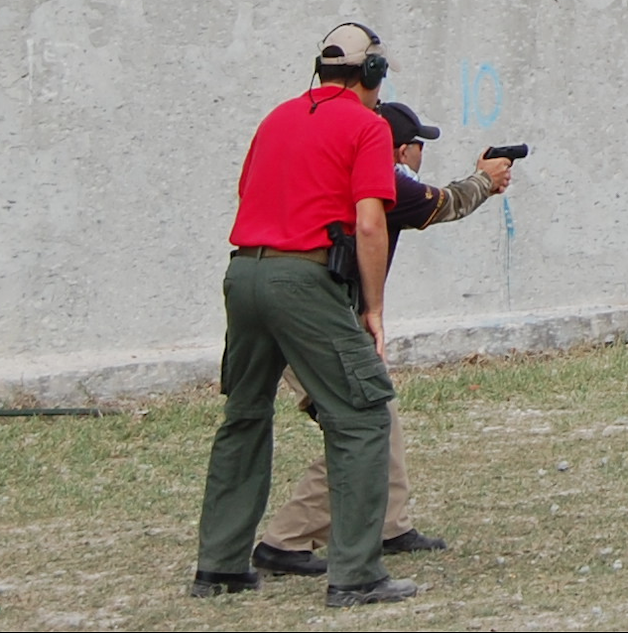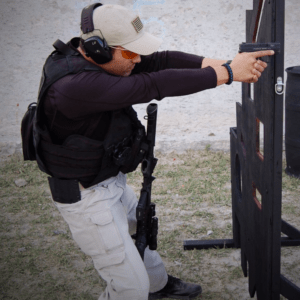Description
FLORIDA FIREARMS CLASS “G” LICENSE COURSE
At Execupro Training Academy, our security training courses are designed to teach you everything you need to know in order to perform the required duties of an Armed and Licensed Security Professional.
Security Officers will learn all the details of firearms safety and practice, the principles of marksmanship, firearms mechanics and liability. Skill development modules shall include marksmanship fundamentals, loading and unloading procedures and proficiency, the 4-step draw and, clearing malfunctions.
All course materials will be in strict compliance with Florida Statutes 493 and Florida Administrative Code legal guidelines 5N-1. The Certificate of Completion for successfully completing this course will be submitted along with the Department of Agriculture, Division of Licensing’s Class “G” Statewide Firearms License Application. Graduating students who apply for and receive the Class “G” Statewide Firearm License are permitted to work as a security officer, or private investigator in an armed capacity.
Students must have or obtain the Security officer “D” License and/or be a Private Investigative C/CC License to apply for the Statewide Firearms License.
The State of Florida requires security officers to successful complete a total of 28 hours of instruction and testing for the Armed Security Officer Class “G” license. We offer the Class “G training course over a 3-day period.
Monday – Friday from 9am-5pm. Weekend classes available.
(Clases disponibles en Español )
Course Syllabus:
Florida Law F.S. Chapter 493
Florida Law F.S. Chapter 5N-1 Florida Administrative Code
Florida Laws F.S. 775,776 & 790.
Legal Issues: Liability (Criminal & Civil)
Firearm Safety
Marksmanship Fundamentals
Firearms Mechanics
Weapon Malfunctions & Stoppages
4-Step Draw
Weapons Maintenance / Cleaning
Proper Use of Concealment and Cover
Range Qualification
493.6115 Weapons and firearms.—
(1) The provisions of this section shall apply to all licensees in addition to the other provisions of this chapter.
(2) Only Class “C,” Class “CC,” Class “D,” Class “M,” Class “MA,” or Class “MB” licensees are permitted to bear a firearm and any such licensee who bears a firearm shall also have a Class “G” license.
(3) No employee shall carry or be furnished a weapon or firearm unless the carrying of a weapon or firearm is required by her or his duties, nor shall an employee carry a weapon or firearm except in connection with those duties. When carried pursuant to this subsection, the weapon or firearm shall be encased in view at all times except as provided in subsection (4).
(4) A Class “C” or Class “CC” licensee who is 21 years of age or older and has also been issued a Class “G” license may carry, in the performance of her or his duties, a concealed firearm. A Class “D” licensee who is 21 years of age or older and has also been issued a Class “G” license may carry a concealed firearm in the performance of her or his duties under the conditions specified in s. 493.6305(3) and (4). The Class “G” license must clearly indicate such authority. The authority of any such licensee to carry a concealed firearm is valid in any location throughout the state while performing services within the scope of the license.
(5) The Class “G” license shall remain in effect only during the period the applicant is employed as a Class “C,” Class “CC,” Class “D,” Class “MA,” Class “MB,” or Class “M” licensee.
(6) In addition to any other firearm approved by the department, a licensee who has been issued a Class “G” license may carry a .38 caliber revolver; or a .380 caliber or 9 millimeter semiautomatic pistol; or a .357 caliber revolver with .38 caliber ammunition only; or a .40 caliber handgun; or a .45 ACP handgun while performing duties authorized under this chapter. A licensee may not carry more than two firearms upon her or his person when performing her or his duties. A licensee may only carry a firearm of the specific type and caliber with which she or he is qualified pursuant to the firearms training referenced in subsection (8) or s. 493.6113(3)(b).
(7) Any person who provides classroom and range instruction to applicants for Class “G” licensure shall have a Class “K” license.
(8) A Class “G” applicant must satisfy the minimum training criteria as set forth in s. 493.6105(5) and as established by rule of the department.
(9) Whenever a Class “G” licensee discharges her or his firearm in the course of her or his duties, the Class “G” licensee and the agency by which she or he is employed shall, within 5 working days, submit to the department an explanation describing the nature of the incident, the necessity for using the firearm, and a copy of any report prepared by a law enforcement agency. The department may revoke or suspend the Class “G” licensee’s license and the licensed agency’s agency license if this requirement is not met.
(10) The department may promulgate rules to establish minimum standards to issue licenses for weapons other than firearms.
(11) The department may establish rules to require periodic classroom training for firearms instructors to provide updated information relative to curriculum or other training requirements provided by statute or rule.
(12) The department may issue a temporary Class “G” license, on a case-by-case basis, if:
(a) The agency or employer has certified that the applicant has been determined to be mentally and emotionally stable by either:
1. A validated written psychological test taken within the previous 12-month period.
2. An evaluation by a psychiatrist or psychologist licensed in this state or by the Federal Government made within the previous 12-month period.
3. Presentation of a DD form 214, issued within the previous 12-month period, which establishes the absence of emotional or mental instability at the time of discharge from military service.
(b) The department has reviewed the mental health and substance abuse data provided by the Department of Law Enforcement as authorized in s. 493.6108(3) and has determined the applicant is not prohibited from licensure based upon this data.
(c) The applicant has submitted a complete application for a Class “G” license, with a notation that she or he is seeking a temporary Class “G” license.
(d) The applicant has completed all Class “G” minimum training requirements as specified in this section.
(e) The applicant has received approval from the department subsequent to its conduct of a criminal history record check as authorized in s. 493.6108(1).
(13) In addition to other fees, the department may charge a fee, not to exceed $25, for processing a Class “G” license application as a temporary Class “G” license request.
(14) Upon issuance of the temporary Class “G” license, the licensee is subject to all of the requirements imposed upon Class “G” licensees.
(15) The temporary Class “G” license is valid until the Class “G” license is issued or denied. If the department denies the Class “G” license, any temporary Class “G” license issued to that individual is void, and the individual shall be removed from armed duties immediately.
(16) If the criminal history record check program referenced in s. 493.6108(1) is inoperable, the department may issue a temporary “G” license on a case-by-case basis, provided that the applicant has met all statutory requirements for the issuance of a temporary “G” license as specified in subsection (12), excepting the criminal history record check stipulated there; provided, that the department requires that the licensed employer of the applicant conduct a criminal history record check of the applicant pursuant to standards set forth in rule by the department, and provide to the department an affidavit containing such information and statements as required by the department, including a statement that the criminal history record check did not indicate the existence of any criminal history that would prohibit licensure. Failure to properly conduct such a check, or knowingly providing incorrect or misleading information or statements in the affidavit constitutes grounds for disciplinary action against the licensed agency, including revocation of license.
(17) No person is exempt from the requirements of this section by virtue of holding a concealed weapon or concealed firearm license issued pursuant to s. 790.06.




